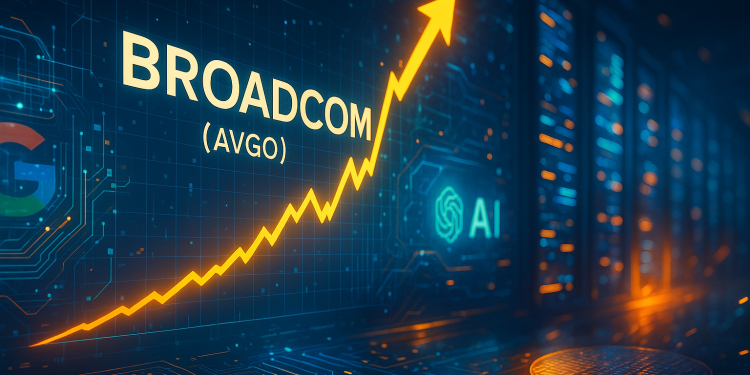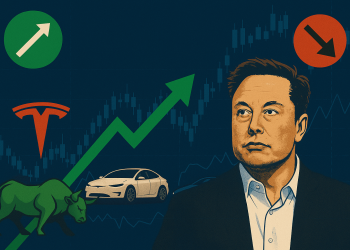Broadcom stock (NASDAQ: AVGO) jumped 10% on Monday as investors rotated back into AI infrastructure suppliers, encouraged by fresh momentum in custom chip demand and Google’s recent AI announcements.
The semiconductor giant closed near $371 per share after the rally, catching momentum from a broader tech rebound and renewed optimism that the AI infrastructure spending spree isn’t slowing down.
The move caps an extraordinary year for Broadcom: the stock is up 60% year-to-date, crushing the S&P 500’s 14% gain.
For traders watching the AI sector, Monday’s pop signals that investors still believe the infrastructure play, not just the software, is where real money flows.
The timing matters because Broadcom has concrete deals backing the hype.
In October, the company announced a landmark partnership with OpenAI to build and deploy 10 gigawatts of custom AI accelerators through 2029, a multi-billion-dollar commitment.
That followed a September shocker: a mysterious $10 billion order from an unnamed customer (widely assumed to be OpenAI itself) that sent the stock soaring 15% in a single session.
Broadcom stock: What sparked the rally?
The immediate catalyst for Monday’s 10% jump was simple: Google showed strength with fresh AI announcements, and that lifted all AI infrastructure suppliers.
But underneath the daily noise sits something more substantial.
Broadcom’s Q3 earnings, reported in September, demonstrated why investors keep coming back.
AI semiconductor revenue surged 63% year-over-year to $5.2 billion, the company’s 11th straight quarter of double-digit growth.
CEO Hock Tan guided Q4 AI revenue to $6.2 billion, representing 66% year-over-year growth. That’s not slowing down. It’s accelerating.
The OpenAI deal announced on October 13 was the real headline, though.
OpenAI will design custom AI accelerators while Broadcom manufactures and deploys them starting in 2026.
The collaboration represents 10 gigawatts of capacity, equivalent to powering 8 million American homes. That’s not theoretical. That’s signed, sealed, and ready to manufacture in a year and a half.
What makes this different from typical supplier deals is the exclusivity angle. OpenAI is hedging against Nvidia’s dominance by building its own silicon.
Broadcom becomes the trusted manufacturing partner. Google, Amazon, and Meta are all doing the same thing—designing custom chips and tapping Broadcom or AMD for production.
This shifts the narrative from “Nvidia owns AI chips” to “The real opportunity is custom silicon at scale.”
What this means for investors and the AI chip race
Here’s the financial reality: Broadcom’s total backlog exceeded $110 billion as of Q3, with AI representing the fastest-growing segment.
The company guided Q4 revenue to $17.4 billion, up 24% year-over-year. These aren’t forecast numbers; they’re near-term visibility into actual orders.
The risk is real, though. Margins are coming under pressure because custom accelerators (XPUs) carry lower margins than traditional chips.
Broadcom’s gross margin is declining as the mix shifts toward AI, a sign that scaling wins doesn’t automatically mean profit wins.
Analyst consensus on Broadcom remains “Buy,” suggesting the stock may already be fairly valued despite the momentum.
What to watch: December earnings call commentary on customer concentration (how much comes from OpenAI?), any new customer wins announced in 2026, and whether gross margin stabilizes.
If the $10 billion-plus backlog converts smoothly into revenue without margin compression, the stock has runway. If integration hiccups emerge or customers delay orders, Monday’s pop could fade just as quickly.
For now, the AI infrastructure gold rush feels real again. Broadcom’s concrete customer wins, not vaporware, are driving the move.
The post Broadcom stock soars 10% on Monday: is the AI gold rush back? appeared first on Invezz














